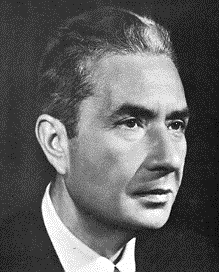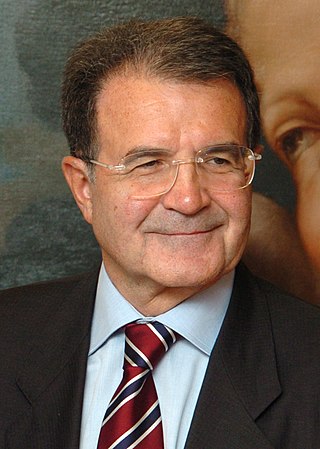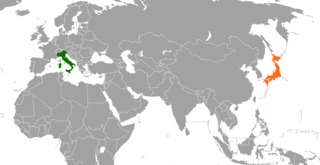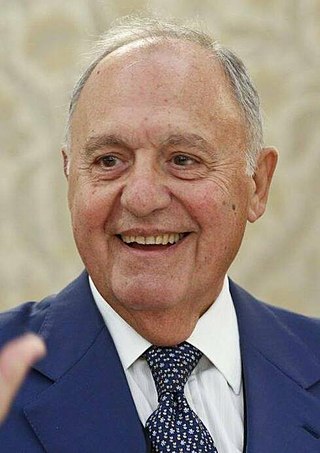
Francesco Maurizio Cossiga was an Italian politician who served as President of Italy from 1985 to 1992. A member of Christian Democracy, he was Prime Minister of Italy from 1979 to 1980. Cossiga is widely considered one of the most prominent and influential politicians of the First Italian Republic.

The Italian Armed Forces encompass the Italian Army, the Italian Navy and the Italian Air Force. A fourth branch of the armed forces, known as the Carabinieri, take on the role as the nation's military police and are also involved in missions and operations abroad as a combat force. Despite not being a branch of the armed forces, the Guardia di Finanza is organized along military lines. These five forces comprise a total of 340,885 men and women with the official status of active military personnel, of which 167,057 are in the Army, Navy and Air Force. The President of the Italian Republic heads the armed forces as the President of the High Council of Defence established by article 87 of the Constitution of Italy. According to article 78, the Parliament has the authority to declare a state of war and vest the powers to lead the war in the Government.

Aldo Moro was an Italian statesman and prominent member of Christian Democracy (DC) and its centre-left wing. He served as prime minister of Italy in five terms from December 1963 to June 1968 and from November 1974 to July 1976.

Romano Prodi is an Italian politician who served as President of the European Commission from 1999 to 2004 and twice as Prime Minister of Italy, from 1996 to 1998, and again from 2006 to 2008. Prodi is considered the founder of the Italian centre-left and one of the most prominent figures of the Second Republic. He is often nicknamed Il Professore due to his academic career.

Edward Nicolae Luttwak is an American author known for his works on grand strategy, military strategy, geoeconomics, military history, and international relations. He is best known for being the author of Coup d'État: A Practical Handbook. His book Strategy: The Logic of War and Peace, also published in Chinese, Russian and ten other languages, is widely used at war colleges around the world. His books are currently published in 29 languages besides English.

An EU Battlegroup is a military unit adhering to the Common Security and Defence Policy (CSDP) of the European Union (EU). Often based on contributions from a coalition of member states, each of the eighteen Battlegroups consists of a battalion-sized force reinforced with combat support elements. Two of the battlegroups were to be capable for operational deployment at any one time. The civil power that oversees these battlegroups is the Council of the European Union.
Geostrategy, a subfield of geopolitics, is a type of foreign policy guided principally by geographical factors as they inform, constrain, or affect political and military planning. As with all strategies, geostrategy is concerned with matching means to ends. Strategy is as intertwined with geography as geography is with nationhood, or as Colin S. Gray and Geoffrey Sloan state it, "[geography is] the mother of strategy."

The Bologna massacre was a terrorist bombing of the Bologna Centrale railway station in Bologna, Italy, on the morning of 2 August 1980, which killed 85 people and wounded over 200. Several members of the neo-fascist terrorist organization Nuclei Armati Rivoluzionari were sentenced for the bombing, although the group denied involvement.

Beniamino "Nino" Andreatta was an Italian economist and politician. He was a member of Christian Democracy, and one of the founders of the Italian People's Party in 1994 and of the Olive Tree centre-left coalition in 1996.

The Logistic Regiment "Julia" is a military logistics regiment of the Italian Army based in Meran in South Tyrol. Today the regiment is the logistic unit of the Alpine Brigade "Julia" and shares with the brigade's infantry troops, the Alpini, the distinctive Cappello Alpino. The regiment's anniversary falls, as for all units of the Italian Army's Transport and Materiel Corps, on 22 May, the anniversary of the Royal Italian Army's first major use of automobiles to transport reinforcements to the Asiago plateau to counter the Austro-Hungarian Asiago Offensive in May 1916.

The following outline is provided as an overview of and topical guide to Albania:

Greece and Italy enjoy special and very strong bilateral diplomatic relations. Modern diplomatic relations between the two countries were established right after Italy's unification, and are today regarded as cordial. The two states cooperate in fields of energy, security, culture and tourism, and are major trading partners, both in exports and imports. Greeks and Italians often exchange the phrase "una faccia, una razza", meaning "one face, one race".

Austria–Kosovo relations refer to the bilateral relations of Austria and Kosovo. Kosovo has an embassy in Vienna and Austria has an embassy in Pristina.

Italy–Japan relations are the bilateral relations between Italy and Japan.
Danijel Žeželj is a Croatian comic book artist, animator, painter and illustrator and author of a number of graphic novels.
Mario Nuzzolese, was an Italian Lieutenant Colonel, teacher, journalist and film critic. He led the Italian cinema and entertainment culture. He contributed to the management and development of the National AGIS Association and managed the Regional Delegation for more than 40 years.

Security studies, also known as international security studies, is an academic sub-field within the wider discipline of international relations that studies organized violence, military conflict, national security, and international security.

The kidnapping and murder of Aldo Moro, also referred to in Italy as the Moro case, was a seminal event in Italian political history. On the morning of 16 March 1978, the day on which a new cabinet led by Giulio Andreotti was to have undergone a confidence vote in the Italian Parliament, the car of Aldo Moro, former prime minister and then president of the Christian Democracy party, was assaulted by a group of far-left terrorists known as the Red Brigades in via Fani in Rome. Firing automatic weapons, the terrorists killed Moro's bodyguards — two Carabinieri in Moro's car and three policemen in the following car — and kidnapped him. The events remain a national trauma. Ezio Mauro of La Repubblica described the events as Italy's 9/11. While Italy was not the sole European country to experience extremist terrorism, which also occurred in France, Germany, Ireland, and Spain, the murder of Moro was the apogee of Italy's Years of Lead.

Paolo Savona is an Italian economist, professor, and politician. He was the Italian Minister of European Affairs from 1 June 2018 until 8 March 2019, his second stint in government after 1993–1994. During the 2010s, Savona became one of the most fervent Eurosceptic economists in Italy.

Richard H. Shultz, Jr. is an American scholar of international security studies. He is a Professor International Politics at The Fletcher School of Law and Diplomacy, Tufts University, where he is also the director of the International Security Studies Program (ISSP).
















